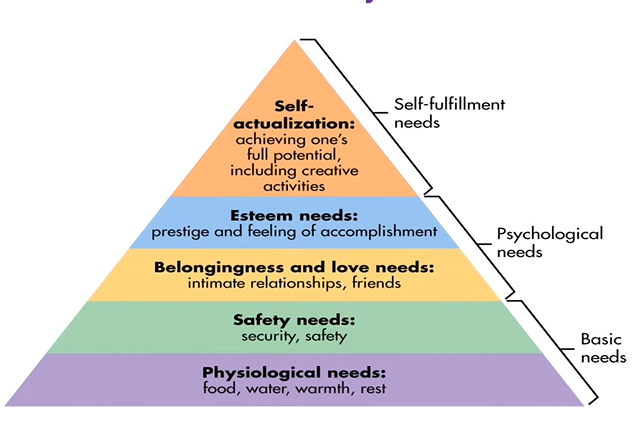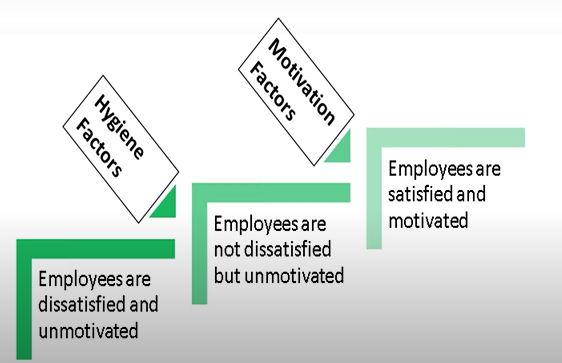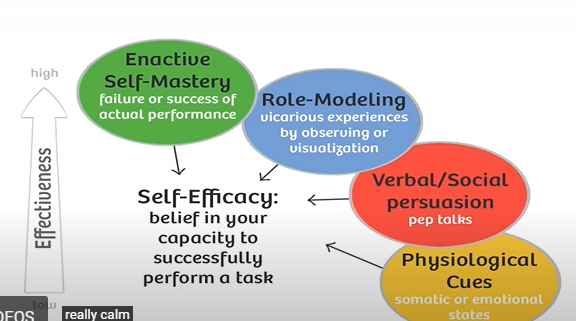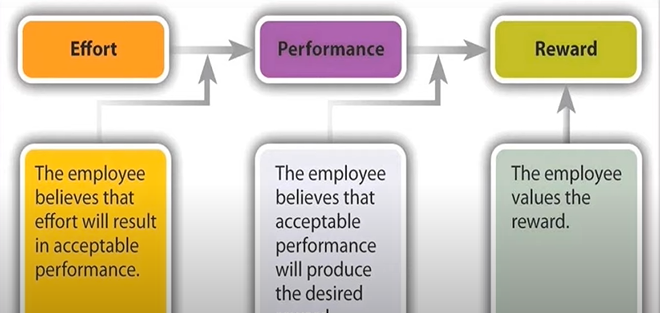MGMT 340 - Chapter 7 Lecture Notes
5.0(1)
5.0(1)
Card Sorting
1/34
There's no tags or description
Looks like no tags are added yet.
Study Analytics
Name | Mastery | Learn | Test | Matching | Spaced |
|---|
No study sessions yet.
35 Terms
1
New cards
Motivated employees w/ high emotional attatchment
- Fewer days off
- Less likely to leave
- Less work-related accidents
- Less quality defects
- More productive
- Increase in overall profitability
- Less likely to leave
- Less work-related accidents
- Less quality defects
- More productive
- Increase in overall profitability
2
New cards
Intensity
- How hard a person tries
3
New cards
Direction
- Where a person puts effort
4
New cards
Perisstnece
Maintaining effort in face of obstacles & set backs
5
New cards
Maslow's Hierarchy of Needs
- Must complete previous need to move up to next level
- Satisfied need no longer serves as a motivator
- Develop ways to determine what employee needs
- Satisfied need no longer serves as a motivator
- Develop ways to determine what employee needs

6
New cards
Two-Factor Theory
Motivators and Hygiene Factors

7
New cards
Motivators (Intrinsic / Internal)
- Opportunity for promotions
- Opportunity for growth
- Recognition
- Responsibility
- Achievement
- Opportunity for growth
- Recognition
- Responsibility
- Achievement
8
New cards
Hygiene Factors (External)
- Supervision
- Pay
- Company Policies
- Physical work conditions
- Relationship with others
- Job security
- Pay
- Company Policies
- Physical work conditions
- Relationship with others
- Job security
9
New cards
McClelland's Theory of Needs
- Need for Achievement
- Drive to excel, meet goals
- Need for Power
- Influence behavior of others
- Need for Affiliation
- Friendly & close interpersonal relationships
- Drive to excel, meet goals
- Need for Power
- Influence behavior of others
- Need for Affiliation
- Friendly & close interpersonal relationships
10
New cards
If you're high on need for power, you:
- Enjoy supervisory, management, & leadership positions
11
New cards
If you're high on need for affiliation, you:
- Perform well in helping professions and working in groups (nursing, physical therapy, etc.)
12
New cards
If you're high on need for achievement, you:
- motivated by sense of accomplishment, like stretch goals or feedback on progress
13
New cards
Goal-Setting Theory
- SMART (Specific, measurable, attainable, relevant, timely) goals
14
New cards
Management by Objectives (MBO)
- Specific Goals
- Participation in development
- Set time line
- Performance feedback
- Participation in development
- Set time line
- Performance feedback
15
New cards
Contingency Variables in Application
- Group v.s. individual goals
- Individualistic vs collectivistic cultures
- Assigned goals or collaboratively set goals
- High power distance vs low power distance cultures
- Individualistic vs collectivistic cultures
- Assigned goals or collaboratively set goals
- High power distance vs low power distance cultures
16
New cards
Self Efficacy Theory
- Belief in your capacity to successfully perform a task
- enactive self-mastery, role-modeling, verbal/social persuasion, physiological cues
- enactive self-mastery, role-modeling, verbal/social persuasion, physiological cues

17
New cards
Enactive self-mastery
Failure or success of actual performance
18
New cards
Role-Modeling
Vicarious experiences by observing or visualization
- Youtube tutorials
- Youtube tutorials
19
New cards
Verbal/Social Persuasion
- Pep talks
- positive self talk
- positive self talk
20
New cards
Physiological Cues
- Low when you feel confident
- Signs of distress
- Signs of distress
21
New cards
Reinforcement Theory
- Based on experiments by B.F. Skinner
- Behavior is a function of its consequences
- Some repeat behaviors are rewarded
- Reduce behaviors by punishment
- Behavior is a function of its consequences
- Some repeat behaviors are rewarded
- Reduce behaviors by punishment
22
New cards
Positive Reinforcement
Something added to encourage behavior
- ex. Congratulating employee after presentation
- ex. Congratulating employee after presentation
23
New cards
Negative Reinforcement
Something removed to discourage behavior
- ex. Someone late to office & reprimand every day, but when on time --> remove reprimand
- ex. Someone late to office & reprimand every day, but when on time --> remove reprimand
24
New cards
Reinforcement does what to behavior
- Strengthens behavior
25
New cards
Punishment does what to behavior
- Weakens behavior
26
New cards
Extinctinon does what to behavior
- Eliminates behavior
27
New cards
Fixed, Ratio Reinforcement
- Completion of a constant number of responses
- works best for new behaviors
- works best for new behaviors
28
New cards
Fixed, Interval Reinforcement
Reinforces 1st response after a constant amount of time
- - works best for new behaviors
- - works best for new behaviors
29
New cards
Variable, Ratio Reinforcement
Completion of a changing number of responses
- most resistant to extinction
- most resistant to extinction
30
New cards
Variable, Interval Reinforcement
Reinforces the 1st response after a changing amount of time
- - most resistant to extinction
- - most resistant to extinction
31
New cards
Inequity
- over-rewarded or under-rewarded
- to eliminate inequities:
- change inputs / outcomes
- change perceptions of self / others
- choose different referent
- leave
- to eliminate inequities:
- change inputs / outcomes
- change perceptions of self / others
- choose different referent
- leave
32
New cards
Distributive Justice
Perceived fairness of outcomes/rewards received
33
New cards
Procedural Justice
perceived fairness of process used to distribute rewards
34
New cards
Interactional Justice
- Whether employees are provided w/ truthful info & treated with dignity + respect
35
New cards
Expectancy Theory
Effort --> Performance --> Reward
